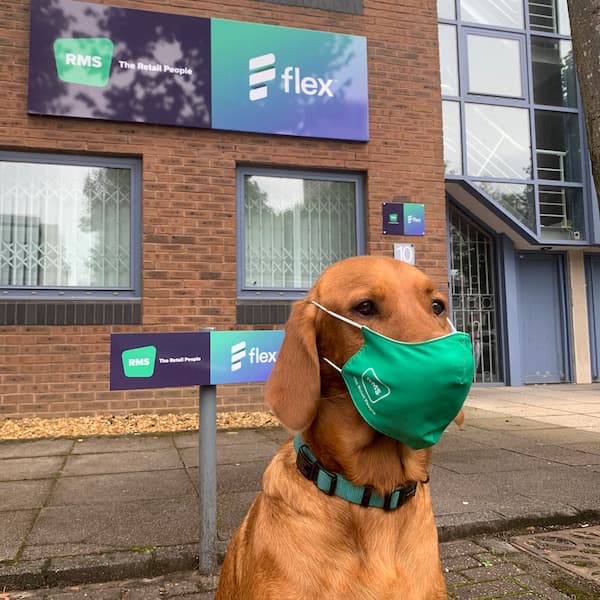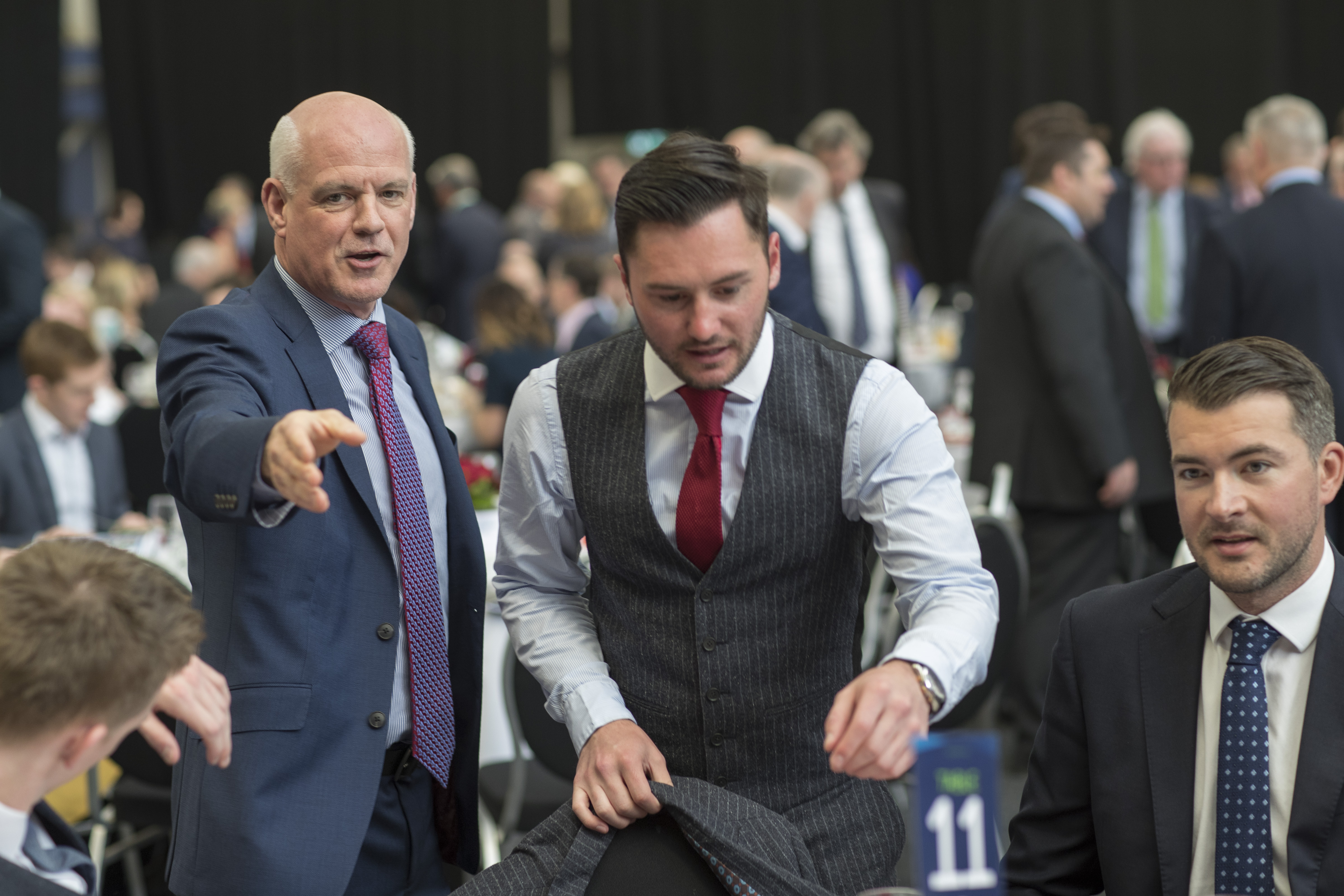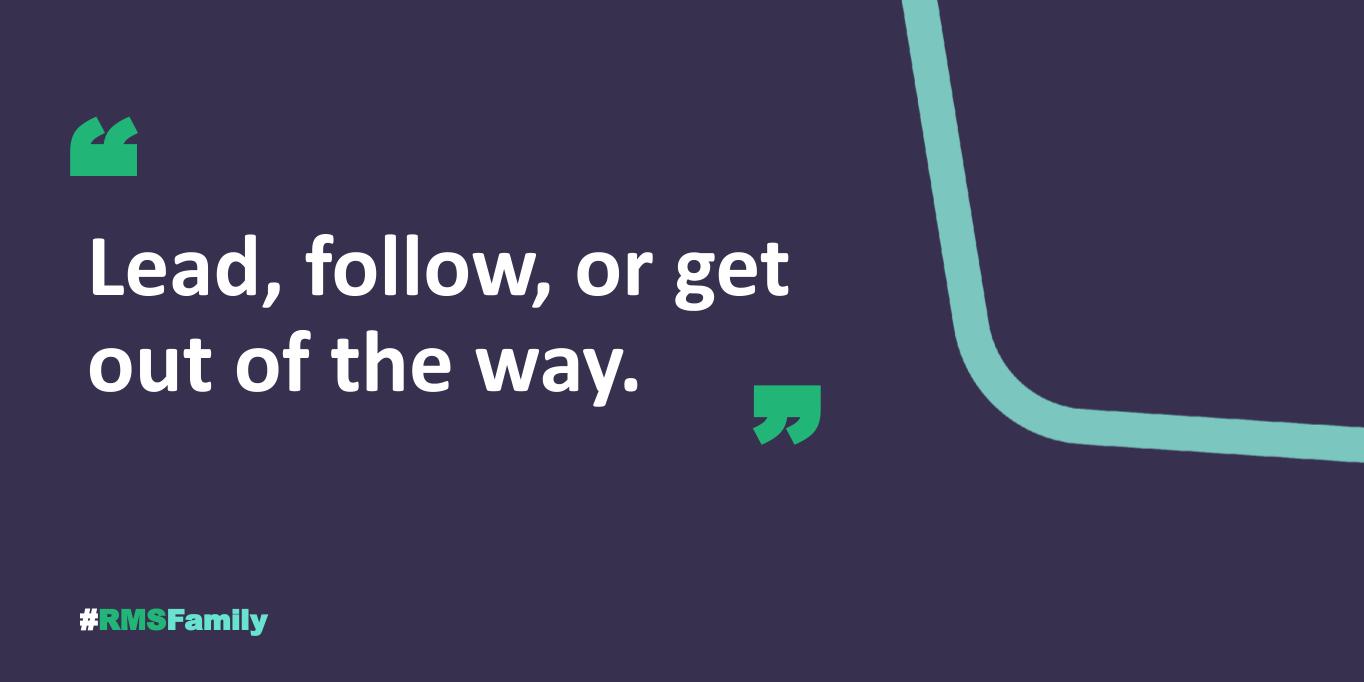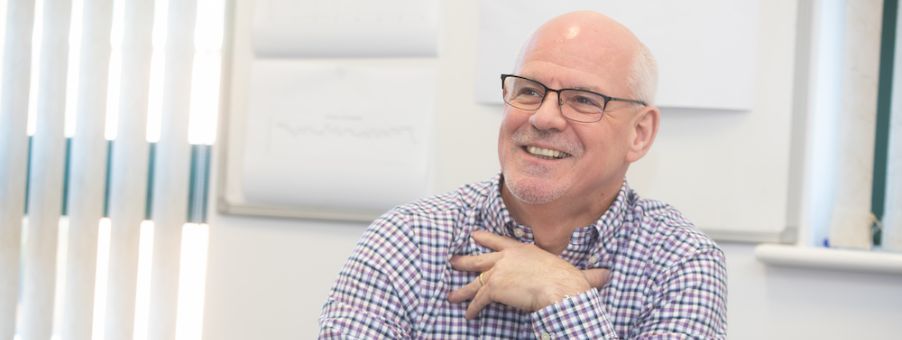In September, after 4 years at RMS, Paul Crook, our Chief Operating Officer, will be retiring. Before he goes, our Marketing Executive, Sam, sat down with him for an in-depth interview where Paul discussed his plans for the future, looks back on a career spanning over 40 years, and shares some nuggets of wisdom.
Sam: What made you decide to take early retirement?
Paul: Anyone who knows me understands that I’m very focused on planning – I’m as focused on planning in my personal life as I am in my professional business life. So, it’s always been part of my plan to try and make an early getaway. To be clear, I’m retiring from executive roles, and by that, I mean being actively involved in the day-to-day management of the business. I’m aiming to develop a portfolio of non-executive roles which will allow me the opportunity to use the experience that I’ve gained from all of the great people I’ve worked with over the past 40+ years. In these roles I’ll be advising a number of organisations on a part-time basis which will probably take up a couple of days every week.
I’m not retiring to put my slippers and cardigan on and smoke a pipe. It’s going to be a fairly active retirement.
Sam: You mentioned about a year ago that when you retired you would quite like to drive the shuttle bus to and from the Celtic Manor, which is a stone’s throw from where you live. Are you still considering doing anything like that?
Paul: (Laughs) If I found that I had nothing else constructive to do, then sure, I’d happily drive the bus. I think the important thing is to keep the brain active.
I was looking back on my career the other night. I started work as a Lifeguard at Risca Leisure Centre when I was 16, so I’ve done 42 years of work in various guises. Looking back on that, I don’t know where the years have gone, but it had always been part of the plan to retire before I turned 65 and utilise my skills to good effect in other areas. I had intended to retire when I turned 55, so I’m a little late, but I suppose the reason for that is because of the opportunity of working for RMS.
Sam: Apart from developing a portfolio of non-executive roles, what are your other plans for when you leave in September?
Paul: The first thing I’m going to do is take a break. For the first time in 42 years, I will take a holiday where I won’t need to be thinking about work. What I’m planning to do is take a month off in Florida to clear my mind and reset. Then I’ll come back in October and be ready to think about the next phase.
Sam: What about hobbies?
Paul: I finished the course I was doing on American Constitutional History which I thoroughly enjoyed, and I’m pretty sure that study of one kind or another will feature in my retirement plan. These days, I’m less interested in collecting certificates and more interested in looking at subjects I really enjoy. Having grown up as a scientist, it’s very nice to study things like American Constitutional History, which is a very different subject to Environmental Chemistry (the subject I graduated in).

Paul loves the USA, and from September he'll be able to spend more time in Florida.
Sam: Let’s talk about RMS. How would you describe the company culture?
Paul: RMS is dynamic, and that comes from the top. We are values-driven which is incredibly important in today’s world. It is a relatively young organisation with an energetic environment that focuses on innovation. People don’t clock watch, and one of the enduring features of RMS is that people are really committed. I have spent a lifetime in a whole range of organisations, from new start-ups through to FTSE listed companies, and the level of focus and dedication that I see within RMS is second to none. That’s down to the people and their commitment to the four core values of integrity, innovation, teamwork, and loyalty, which are key to delivering world-class customer service.
I have always believed in a relentless focus on customer service. If you deliver a good job for a customer, no matter what else, they will always come back to you for more. We’ve demonstrated that over and over again, and the team have really bought into it. We make decisions based on our values, and integrity in particular, something which seems in pretty short supply in commercial environments these days. It’s something that Daniel O’Toole (CEO of RMS) has led, but I think that the whole organisation has bought into those values. That’s what makes it a different kind of company to work for.
Sam: You and I started working for RMS at the same time, and going back to what you said a moment ago about no clock-watching, it was a breath of fresh air for me when I came on board. I think it’s those sorts of things that have enabled us to excel during this past year. Whereas with some companies it would have been a huge learning curve in regard to working from home, we just cracked on with it, didn’t we?
Paul: It was seamless. We were so prepared that we moved to home-working even before the lockdown was announced. Our technology had already been tested, so we were ready. We’ve learned over the past twelve months that we don’t need an office at all; we can operate from anywhere in the world as a team, while continuing to deliver and innovate. I think it’s been a real lesson to everyone. Whereas some organisations are rigid and fixed on having an office, we are the complete opposite. In fact, I’ve only been to the office once or twice since February 2020, and that says it all. That is a recipe for success. People have embraced it. If I ever need something or need to talk to someone urgently, I don’t get any of the kind of stuff that you’ll encounter in some of the large corporates where they’ll say, “It’s 5 o’clock, I’m finished for the day.” Everybody is looking out for everybody else, and that’s an attribute that needs to be valued and nurtured, because that’s true teamwork.
Sam: What is your favourite memory of the past few years at RMS?
Paul: There have been so many. For me, it’s when we’ve had big wins. By that, I don’t necessarily mean contract wins, although they are important. I also mean those times when we’ve been able to win over sceptics, expand our service offering, or break new ground.
Then there’s the fun side – the camaraderie within the business. For example, Mike Higgins (link to Mike’s interview) singing Queen’s Don’t Stop Me Now on the coach back from the Cheltenham Festival in 2019, which was our belated Christmas party. We couldn’t have a party in December because we were so busy, so that is a great example of us working hard together and then being able to relax and enjoy each other’s company.
We’ve had the crazy festive periods, particularly the one a couple of years ago where we deployed over 5,500 members of staff to stores across the country. That was a crazy time, and a perfect example of RMS teamwork, as the team cancelled their Christmas plans and pulled together to ensure that we delivered an optimum service for our retail partners.
Also, I can’t forget the time when Murphy (RMS’s Chief Moral Officer) left me a present in my office when he was a puppy, as his bathroom habits weren’t too refined at that point.

Paul is going to miss his good pal Murphy.
Sam: (Laughs) Moving on… What other roles did you have before you joined RMS?
Paul: I graduated as an Environmental Health Officer and spent almost ten years in local government, rising through the ranks to become a Chief Officer by the time I was 27. Then I was headhunted out of local government into the world of consultancy, beginning as a practice manager and then progressing to become Director of Consultancy. That was focused on the public sector (housing and public health). That same organisation (a French multinational) owned a number of service businesses in the UK, and due to circumstances, and perhaps a little bit of luck, I was spotted and invited to move into the service business, which provided large-scale outsourced services for major blue chips including retailers. That’s how my career in services took off, and it’s where I spent the next 25 years.
One of those roles was with Atkins Global, where I was the Managing Director of Corporate & Retail Asset Management. My biggest customers were M&S, Boots, Barclays, and a host of other High Street brands. The purpose of that business was to look after the infrastructure of the buildings, including the mechanical and electrical aspects that are essential to the running of a retail operation. Therefore, I was very familiar with the retail culture before I joined RMS.
My career has always been focused on customer service. Much of it has been B2B, but some of it was B2C, because along the way I did spend five years in commercial & residential property management.
In terms of the work we do at RMS, it is B2B, but in a sense it’s also B2B2C, because it is the end-user, the shopper, who benefits from our efforts in delivering a ‘better shopping experience’.
Sam: Why did you decide to join RMS?
Paul: There’s a few reasons that conspired to help me make that decision. First of all, I’d spent the previous 25 years living out of a suitcase, being away from home for a minimum of 4 nights a week. There was a lot of travelling involved, and a lot of time spent in London. I didn’t find it particularly rewarding towards the end. So, I was thinking that Wales could do with my experience as much as anywhere else.
The second reason was that I saw an advert for the COO position, and RMS was based around the corner from where I live. Never in my entire working life had I been able to walk to work.
The third, and probably the most important reason was down to Dan himself. We hit it off from the start. After several conversations with Dan, sitting in the sunshine at the Celtic Manor with a glass of cider, I was convinced that it was the right choice. It was very clear to me that he was driven by values rather than greed. I was particularly struck by his humanity and humility, and could see myself working well with him.
Like me, Dan studied chemistry at university, so he came from a similar academic background. Also, the experience that he had been through with his dad was very similar to my own life experience, and so I thought, ‘Here is a genuine guy who is looking for support and he’s on my doorstep. The role ticks all of the boxes for me in terms of limited travel, it’s a very interesting business, and I think that I can really make a difference and add value.’ When Dan explained what he was trying to achieve, it was a challenge that I simply couldn’t refuse.

Sam: How did working for a small, family-owned business compare to working for a larger, more corporate organisation?
Paul: Working for a smaller business is very different, in a good way. Decision-making is more immediate, and the team is more intimate and focused. It’s more personal and engaging, and the impacts of decisions are immediately visible.
Sam: What do you think the future holds for RMS, and also the entire retail industry?
Paul: RMS has to continue its commitment to delivering world-class service. Providing that it stays true to its values, then the opportunities will be huge.
Part of the reason for my retirement at this time is that RMS needs someone in the COO role who can commit to at least 5, ideally 10 years, to oversee the next phase of development. There are 3 phases to growing an organisation: consolidation, anchoring, and expansion. What I’ve done in my tenure is look after the consolidation by resolving issues and overcoming challenges. We’ve then moved onto the ‘anchor’ phase. Everyone in the organisation now knows what our business model is; they understand what we do, how we do it, why we do it, and how we make money. We’ve anchored everybody to a place where we can now look at expanding. In order to move that forward, it involves not just more clients, but also diversifying the business into higher-value activities such as project management, installation, and programme management. We’ve started all of that, but we now need to accelerate it and initiate a new 5-year plan, with the new COO’s active participation.
To sum up, the future for RMS looks very promising. There are huge opportunities, and we are the best at what we do, without a shadow of a doubt. We are streets ahead in terms of our intellect, thought leadership, innovation, our systems and flex™ technology, and that will stand it in great stead as the business looks to expand.
In terms of the wider retail sector, in my opinion, the danger is the lip service paid to working conditions in the sector (particularly in agency) and the continuing trend to commoditise people. I saw it happen in the Facilities Management sector in the late 90s/early noughties, where service companies were forced to produce ever-cheaper solutions. When you’re in an industry that relies on human beings to deliver the service, there is a tipping point that you cannot go beyond. If retailers continue to ‘nickel and dime’, it will lead to service failure and supply chain bankruptcies, which is exactly what happened in the broader service sector.
If organisations like RMS don’t stick to their values and principles, it will happen again. Cheap is rarely good. For me, it’s not about the price. It’s about the value that a solution brings.
What these last 12 months have taught us is that retail workers are critical workers, commoditised at the retailer’s peril. They are as vital as the health workers, and we should never forget that.
Sam: You have been integral to the growth and development of RMS since you started in 2017, and won’t be easily replaced. What skills and qualities will your successor need?
Paul: I’d like to think that my successor will have a breadth of experience similar in nature to my own, because I do think that a broad experience of operations, commercials, contract management, bidding is essential. We’re a small organisation and don’t have huge departments that can deal with these things. Basically, the role is hands-on and encompasses the many aspects of service and business management.
A clear focus on customer service is imperative, and a commitment to the workforce will be essential. I don’t just mean the management team, but the field teams who wear our logo and work in-store every day. Those attributes are critical. In addition, experience of working for a small business or a new start-up is crucial. If you’ve only ever worked for a big corporate and then came to RMS, it would likely be a shock to the system.
Sam: You are well known throughout the company for your one-liners and golden nuggets of wisdom. What is your all-time favourite quote?
Paul: It would be difficult to pick just one. I’m fond of the funny ones, such as, ‘Arguing with an idiot is like playing chess with a pigeon… No matter how good you are, the bird is going to s**t on the board and strut around like it won anyway.’
Then there’s the 7Ps, the British Army adage for ‘Proper Planning & Preparation Prevents P**s Poor Performance.’
I also like this quote from General Norman Schwarzkopf, who led all coalition forces in the Gulf War. When someone was praising him on the news, he said, “My involvement is quite different to the guys on the ground. It’s a bit like cooked breakfast.” When asked for clarification, he said, “In terms of bacon and eggs, the chicken is involved, but the pig is committed.”
However, the one that has stuck with me throughout my career is this: ‘Lead, follow, or get out of the way.” Perhaps in my retirement I could write a compilation.

Sam: Final question. The events of the last year have disrupted the job market for young people. What advice would you give to them to strengthen their prospects?
Paul: The most important thing is to always have a plan, but also to recognise that that plan may need to be modified. People need to think about their future and do something that they feel they’re good at and is rewarding, rather than doing something that might, in the short term, bring advanced benefits, but won’t bring long term satisfaction. In addition, stay focussed, always look to grow and progress, and face life with enthusiasm.
Also, flexibility is key. I initially wanted to be a doctor, but ended up being an Environmental Health Officer and moved into consultancy, then services management, followed by property management, and finally retail. So, the reality is that anyone who’s starting their working life now will undoubtedly change lanes multiple times. Being open to those changes is very important because when one door closes, another one opens. It might not be what you thought you’d do, but there are always opportunities if you’re willing to adapt and not fear change, because change is a good thing.
My final bit of advice for young people is to find a company to work for that is values-driven. A company that doesn’t just tick the boxes to gain the badges and accreditations, but one who lives and breathes their values and principles. I think that Generation Z, in particular, are much more focused on values, when compared to any previous generations, and that’s a real challenge for companies in the modern world.
